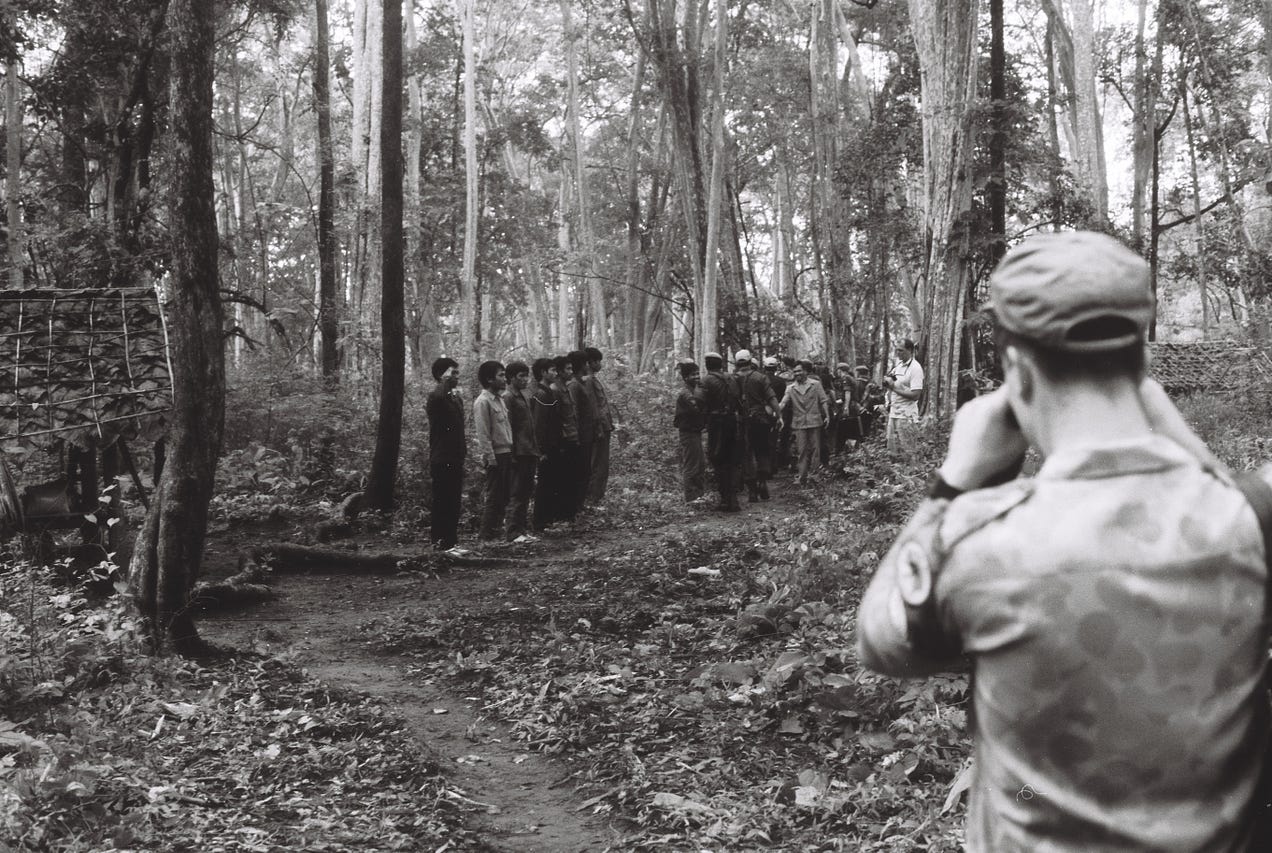After journalist Nate Thayer died on January 3, 2023, I reached out to Theo Rlayang, a Montagnard friend in Greensboro, North Carolina, and asked him to share this sad news with Nate’s old friend, Pastor Y Hin Nie. Thayer met the pastor deep in the forest of Mondulkiri, Cambodia, in 1992. At that time, Y Hin Nie was serving as FULRO’s (Front Unifié de Lutte des Race Opprimées, or the United Struggle Front for the Oppressed Races) Representative of Foreign Affairs and translator. This Montagnard army had been fighting the Vietnamese since 1964, and in 1992, almost three decades later, still had not surrendered.
When I spoke to Y Hin Nie in early February, he offered to organize and preside over a Montagnard memorial for Nate at the United Montagnard Christian Church in Greensboro. In short order, Y Hin Nie, Nate’s former Phnom Penh Post colleague Sara Colm, and I began planning what turned out to be a remarkable event attended by FULRO veterans, members of the Thayer family, Nate’s former colleagues, Montagnards, and many others.
Sometime in the 17th century, the acerbic Zen Buddhist monk Takuan Soho (1573-1646) wrote a letter to Yagyu Munenori, one of Japan’s greatest swordsmen and teacher to two generations of shogun. In it, Soho described the highest level of martial mastery as action without hesitation, what he described as “immovable wisdom.” I believe, that for most of the 1990s, Nate Thayer was the living embodiment of Soho’s “immovable wisdom.”
From the Khmer People’s National Liberation Front, to the United Nations Transitional Authority Cambodia, to the Khmer Rouge civil war that preceded Cambodia’s 1997 civil war, to Pol Pot, Nate was usually so far ahead of his journalistic peers that the only competitive race was for second place.
I feel fortunate to have witnessed Nate at the height of his powers. Not only was I inspired by his unwillingness to consider, much less accept, the limits of the possible, his example raised the bar of performance for many of us who came in contact with him because steel sharpens steel.

Nate Thayer (right) looks on as FULRO fighters greet U.N. soldiers in Mondulkiri province, Cambodia, in 1992. (Photo: Nate Thayer collection)
After his passing, much was made of Nate’s Pol Pot interview, his principled refusal to accept the Peabody Award, his lawsuit against ABC, and his inability to finish his book “Sympathy For the Devil.” The stories about the shaved-headed, hard-living, tobacco-chewing Gonzo journalist made for good copy, but overlooked what was the most significant and meaningful work of Nate’s career. Thayer’s 1992 Phnom Penh Post and Far Eastern Economic Review stories about FULRO’s “Forgotten Army” opened the world’s eyes to the plight of the Montagnards, America’s most loyal and valiant allies during the Vietnam War.
Nate was not a journalistic seismograph, he was a lightning rod, and the three trips he took to the last FULRO camp in the forest of Mondulkiri energized and galvanized him. After bearing witness to the highlanders’ unbreakable faith, talking with their leaders long into the night about their future, and standing shoulder to shoulder with his friend Y Hin Nie as he buried his son, the Montagnards’ plight became his own.
Once again, leading by example, Nate inspired many others to right one of the most egregious wrongs of the Vietnam War. In record time, an unlikely coalition of diplomats, U.N. officials, human rights workers, missionaries, Vietnam veterans, journalists, spooks, and American politicians of all persuasions put their obvious differences aside, crossed party lines, slashed diplomatic red tape, and helped clear the way for the Montagnard exodus to the United States.
When Y Hin Nie and FULRO’s forgotten army began their long journey from the Cambodian forest to sanctuary in America, Nate accompanied them every step of way. Today, North Carolina has the largest Montagnard population outside of Southeast Asia, and that is Nate Thayer’s greatest legacy.
This article was initially published on the Substack newsletter Sour Milk.
Steel Sharpens Steel: Remembering Nate Thayer
Source: Frappler

0 Comments